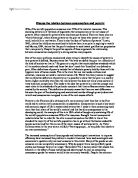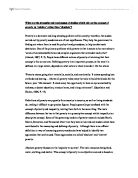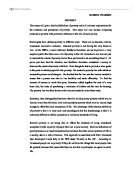The next definition popularised is that of relative poverty, in essence, ‘Our needs and enjoyments spring from society; we measure them therefore by society and not by the objects of their satisfaction. Because they are of a social nature, they are of a relative nature’ (Marx, K. as cited in Mclellan, 2000). It is linked primarily with the work of Townsend, who (after undertaking initial research in which he too equated poverty with low income) recognized household income as an insufficient measure of poverty and expanded upon it to include the diet, social activities, living conditions and amenities accessible to a majority of other members of society (Alcock, 2008). The ideal used presently by the government combines the aforementioned definitions, and is based on a Poverty and Social Exclusion survey conducted by David Gordon et al which contains both commodities deemed necessary by society and resources required for survival (Alcock, 2008).
It is also Townsend that the idea of social exclusion as a concept can be traced back to, as in Poverty in the United Kingdom (1979) he argued that poverty created social exclusion, as it denied individuals the right to a lifestyle experienced by other members of their society. Membership of the European Union has played a large role in introducing social exclusion as a policy problem, as it is an issue they have prioritised as such, to the extent that it has become somewhat synonymous with poverty in European politics. The 1997 Labour government followed suit, and the Centre for the Analysis of Social Exclusion was created, where the definition of social exclusion was defined as a lack of ability to participate in social activities, such as political engagement, social interaction and consumption of goods and services (Alcock, 2008). This provides a clear differentiation from even relative poverty, as it focuses on relationships as well as material resources.
The distinction between the concepts of poverty and social exclusion is important in terms of welfare for several reasons. Firstly as the key aims of welfare are to provide vertical distribution from the rich to the poor and redistribution between different groups of society (Hills, 2008) and secondly because the distribution of welfare is a contentious issue, as although most welfare policies do a specific group in society a considerable amount of good this can often be at the expense of others groups (Spicker, 2008).
Welfare is provided in many different ways, but there are three primary categories of social security available; universal, which applies to all citizens that meet relevant criteria, means tested, which includes those that do not earn above a set income and social insurance benefits, to which an individual must have made a particular amount of contributions to be entitled to claim (Hudson, 2008). In the case of poverty it is means tested benefits that appear the most relevant, and this relates largely to the aforementioned contentious nature of welfare distribution, as these are financed for the most part through taxation (Hudson, 2008). As previously mentioned the more recent tendency to combat social exclusion in addition to poverty may be related to this, as there is not the same stigma attached to social exclusion based benefits that there is to poverty welfare benefits (Blakemore and Griggs, 2007), so they may semantically amount to the same thing but socially appear different, which would suggest that it may be a lack of distinction between the two concepts that is important for welfare of particular social groups.
Although it can appear less of an issue social exclusion is as much of a policy problem as poverty, as the term initially referred to those left out of the support system a welfare state fosters (Spicker, 2008). Unlike poverty social exclusion cannot be simplified to a lack of resources, and this is evident in the manner it is tackled though welfare. Despite social exclusion focusing on the lack of relationship between the individual and wider society in general the policies relating to it tend to focus more on employment and education (Blakemore and Griggs, 2007) as methods of inclusion, possibly as these would be the most use to society, and also as they would allow people to help themselves and remain autonomous. This is also a key difference in welfare provision, as there is far more emphasis on `active welfare` in social exclusion policies than in poverty policies (Blakemore and Griggs, 2007). It should of course be taken into account that, with the increase of individualism in the twentieth century (Spicker, 2008), people that the government would deem socially excluded may choose to be so. There are those that may deliberately disenfranchise themselves from aspects of political and consumer life as they do not agree ideologically with them, and this may lead to reduced take up in social exclusion benefits which would make a divergence between social exclusion and poverty vital for welfare of individuals, as it is difficult to imagine anyone would choose to be poor.
As of yet the assumption has been that welfare policies are intended purely to improve people`s welfare, but it should also be taken into account that the differences between poverty and social exclusion may have wider welfare implications. Social policies can also be used to maintain the status quo (Spicker, 2008), as from a Marxist perspective they are tools of the capitalist society of the UK (Lavalette, 2006). Taking into account that those in charge of making welfare policy fall under neither the definitions of poverty or social exclusion it is possible that welfare policies aimed at the two concepts differ as those that address poverty attempt to legitimise the system and portray the idea that a capitalist society provides benefits for everyone, and those that tackle social exclusion would be focused on creating a cohesive workforce (Lavelette, 2006).
In conclusion the differences between the concepts of poverty and social exclusion become somewhat clearer once their development is explored, although they remain somewhat congruent as overlapping social problems. In terms of welfare the distinction between the two appears important for individual benefit as those experiencing poverty or social exclusion have different problems, but on a collective level the divergence may be detrimental as policies addressing social exclusion lack the stigma associated with poverty whilst still providing a higher standard of living for those who need such.
Bibiliography
Alcock, P. (2007). Poverty and Social Exclusion. In P. Alcock, M. May and K. Rownlingson, eds. The Student`s Companion To Social Policy. Blackwell Publishing Ltd, pp. 131-138.
Blakemore, K & Griggs, E. (2007). Social Policy an introduction. Open University Press.
Hartley, D. (2006). Social Policy. Polity Press.
Hills, J. (2007) The Distribution of Welfare. In P. Alcock, M. May and K. Rownlingson, eds. The Student`s Companion To Social Policy. Blackwell Publishing Ltd, pp. 139-148.
Hudson, J., Kuhner, S. and Lowe, S. (2008). The Short GuideTo Social Policy. Policy Press.
Lavalette, M. & Pratt, A. (2006). Social Policy Theories, Concepts and Issues. Sage Publications Ltd.
Mclellan, D. (2000). Karl Marx Selected Writings. Oxford University Press.
Piachaud, D. (1981) 'Peter Townsend and the holy grail', New Society 10th September: 421.
Spicker, P. (2008). Social Policy Themes and Approaches. Policy Press.
Townsend, P. (1979). Poverty In the United Kingdom. Penguin Books.








